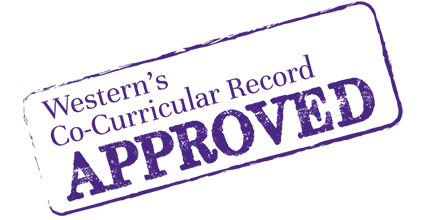Co-Curricular Experiential Learning
There are many ways to get involved in experiential learning outside of the classroom. These co-curricular activities below can be experiential learning in nature if the experiential learning principles are met and the activity is recognized on Western's Co-Curricular Record.
What is the Western Co-Curricular Record?
Western's Co-Curricular Record (WCCR) is a tool to formally recognize your co-curricular involvement at Western, track your experiences outside of the classroom, and articulate the transferrable skills you gained through those experiences in graduate school applications and to potential employers .
How to use your Western Co-Curricular Record
- 1. Log in to your record at connect.uwo.ca. Select "Records & Certificates" on the left-hand side.
- 2. Search for activities you are already involved in, or would like to be involved in.
- 3. Participate in activities, meet other people in the Western community, build your skills and start writing your story.
- 4. Add activities to your record, and reflect on the skills and abilities you have developed through your participation.
- 5. Have your position validated by Western faculty and/or staff members.
- 6. Customize your record for job applications, volunteer opportunities, or graduate program applications.
Deadline for 2024-2025
The deadline for students to add 2024-2025 activities to their Western Co-Curricular Record is April 30, 2025.
Why Co-Curricular Experiential Learning?
Your academic transcript only tells part of your story. In addition to proficiency in your field, employers are looking for transferable skills developed through hands-on or on-the-job experiences. These skills can be developed outside of the classroom while you are at Western.
Your co-curricular experiences support and supplement your learning in the classroom and vice-versa, turning theory and knowledge into practical skills and experience. This complementary nature makes your involvement in co-curricular opportunities all the more enriching and valuable. Leverage these opportunities to explore a variety of career options that will equip you to effectively transition to the job market.
Career Preparation / Professional Development
Definition: Intensive work
Examples:
- Career Education: Multiple Mini Interview (MMI) Preparation Workshops
- School of Graduate and Postdoctoral Studies: Own Your Future
- School of Graduate and Postdoctoral Studies: Postdoctoral Competitive Edge Program
Community Engaged Learning

Definition: Students engage in a non-credit project, developed collaboratively with a community partner, that has mutually beneficial outcomes.
Examples:
Entrepreneurship

Definition: Engagement in organized activities related to entrepreneurship and innovation.
Examples:
Short-term Internship

Definition: Paid, supervised work experience during a single academic term.
Examples:
- School of Graduate and Postdoctoral Studies: Graduate Student Internship Program (GSIP)
- Huron University College: Career Internships
Living Learning Communities
Definition: Residence students live in intentionally-designed learning communities that are framed by shared values, common interests, or academic discipline, and participate in a series of structured learning activities.
Examples:
- Residence Communities and Floors (Faculty-based Learning Communities, Interest-based Learning Communities, Lifestyle-based Floors)
Resources:
- Residence Guide: Living Learning Communities
Student Clubs and Associations
Definition: Approved or recognized student-led groups based on a shared interest or goal.
Note that not all clubs are experiential learning in nature. Contact Experiential Learning to learn more about experiential learning within this context.
Examples:
- University Student's Council (USC): Clubs
- Sport & Recreation: Varsity Athletics
Student Government
Definition: Representative bodies of elected students who advocate for constituents, provide leadership and service, facilitate programs, and may potentially oversee students fees.
Examples:
Student Leadership
Definition: University-sanctioned opportunities for students to develop their skills while contributing to the Western community.
Examples:
- Transition Leadership & Enrichment: Western Peer Leaders
- Transition Leadership & Enrichment: Leadership and Academic Mentoring Program (LAMP)
- Become a Soph: Faculty, Residence, Off Campus, Charity
- Indigenous Services: Indigenous Student Groups
Work Study

Definition: Paid part-time work experiences offered by the university for eligible students who demonstrate financial need.
Western’s Work Study Program offers an opportunity for students to work part-time on campus in jobs that accommodate their studies. On-campus employment can play an important role in skill development, goal realization, career exploration and preparation, and increased student engagement (McClellan, Creager, & Savoca, 2018). In 2018-19, a pilot project was introduced, which saw participating Work Study Supervisors and students engage in a number of structured activities (goal-setting, critical reflection, self-assessment, and evaluation) aimed to enhance the overall Work Study experience. Students can access a package of goal-setting, reflection, and assessment materials below.
Examples:
- Office of the Registrar: Work Study at Western
- Western International: International Student Work Study Program
Resources:
On-Campus Work Experience
Definition: Paid work experience offered by a Faculty or administrative unit.
Research Assistantship
Definition: Paid work experience offered by the university through which students carry out supervised research-related duties.
Teaching Assistantships
Definition: Paid work experiences offered by the university through which graduate students carry out supervised teaching-related duties.
Volunteerism
Definition: Students participate in university-sanctioned, unpaid activities or projects with campus or community organizations.
For more co-curricular experiences, check out the Western Co-Curricular Directory


